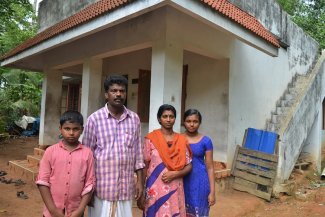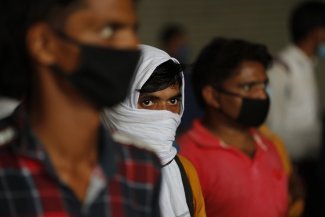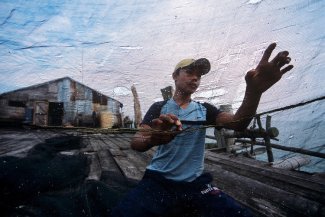Below is an extract from Rejimon Kuttappan’s new book ’Undocumented: Stories of Indian Migrants in the Arab Gulf’ (Penguin Random House India, 2021). Kuttappan is a migrant rights researcher and journalist, who also contributes to Equal Times. In this book, he explores the lives of Indian migrants in the Gulf region, asking questions surrounding human rights, exploitation, marginalisation and trafficking. This edited excerpt contains the first-person testimony of Majeed, an undocumented Indian migrant worker from Kerala who got stranded in Oman in 2011. As he had no documents or money and as there was no amnesty for migrant workers in Oman at the time, Majeed decided to make the perilous crossing to the United Arab Emirates by foot with the help of Pakistani and Bangladeshi traffickers, where Majeed planned to ask the Indian embassy to send him back home.
“You know that we tried our best to fly out of Oman with whatever papers we had, right? But it didn’t happen. So, I agreed to crossing the border. One by one, all the others said yes as well. Rabiul and Shariful told us that we should start walking by 10pm. Rabiul told us that it would be a six-hour walk through the mountains. We were eight, with the Pakistanis, including the driver, who was also the guide, and myself.
It was not very dark because of the moonlight. As we were walking through a valley, one of the men told me that there would be snakes and wild dogs. Another one told me that we may have to walk for three hours continuously through the valley, and then climb the mountain and continue for three more hours more hours. At that point, I was doubtful whether we would make it…
At around 2am, we started to climb the mountain.
There was no light. Only the Pakistani driver knew the route. He was walking in front of us. While walking through the valley, I stepped on a broken glass bottle. The glass pierced through the slipper on my right foot. The cut was deep.
I cried in pain and fell to the ground. All the men ran towards me. One of them helped me sit up. Another man switched on the torch on his mobile phone.
My foot was bleeding. I had a bottle of drinking water. One of the men took it from me, opened the lid, and poured a little water over it. After washing the wound, they pulled out a glass piece from the cut. It was painful. I wanted to scream, but they told me not to because it would draw the attention of the people and also the valley dogs.
Oman valley dogs are ferocious. They will attack anyone. So, my companions told me to bear with the pain and not scream. It was horrible. Even though we were able to take out a big piece, there were still a few [shards of glass] left in the wound. We were not able to spot them with the mobile torchlight.
We had to wrap the wound tightly, but we didn’t have any cloth. I realised that I was wearing a vest, too. So, I took off the shirt, removed the vest, and tore it into long pieces.
One of the men wrapped one of the pieces on the wound and tied another on my calf. They helped me stand up. It was painful. My injured leg was shivering. Could I walk? Could I climb the mountain? I was doubtful.
But going back was not an option. We had crossed halfway already. And even if I wanted to return, I couldn’t do it alone. I was afraid of the darkness. I didn’t know the route. Who would accompany me?
Either I had to wait till daylight breaks and walk back, or I had to continue on the journey. I decided to continue. It was the best option.
“I couldn’t have made it without them”
With the help of my companions, I wore my shirt and stood up. I was limping while holding on to them for support. I knew that I had become a burden, and yet, they were not ready to leave me.
They were telling me...‘Bhaii…hum to hain…[Brother…we are there…]’ I only knew the driver’s name. His name was Musafar. He told me that while we were in the truck. I didn’t know anyone else’s name. They were all calling each other, and me, Bhaii.
Without them, I could not have crossed the border, Reji.
Even though my companions helped me walk after the injury, I slipped and fell on the loose stones several times. In addition to the cut, I suffered a few bruises on my left hand and lower jaw. Even though there was no bleeding there was swelling. I had also bit my tongue when I fell so it was difficult to speak.
The bhais decided to rest for a few minutes for me. Musafar told me that we would be entering Al Ain [a border town in the UAE] soon and that it was the last point where we could make a phone call. I called Comrade John [a man from Kerala who had been helping Majeed while he was in Oman]. He was waiting for my call. I didn’t tell him about the injuries. I just told him that, so far, all was well.
From there, again, it was a three-hour journey. Everything looked grey under the moonlight. We had to walk together through an area filled with shrubs that hid venomous snakes.
Musafar told us to be cautious. If a snake bit us, we won’t be able to do anything. The only thing we had was a knife to cut the wound and a piece of cloth to tie above it. And the chances of crossing the border after a snake bite were very low.
We hurried to cross the border before the daylight broke to avoid getting caught by the police.
It was around 4am then. We only had three more hours before daylight would break. At around 8.30am, we reached the Al Ain side. Musafar had a UAE SIM. Comrade John had shared the Al Ain comrade’s number with me. When I rang that number, they were able to locate our position. They told us to wait there. In 20 minutes, two Keralite comrades came to our side and one of them called my name out.”












